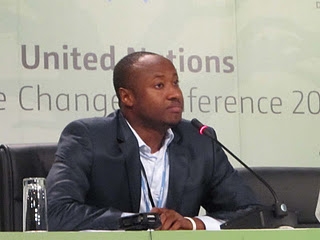There is every likelihood that the negotiating text for a new climate change agreement, already circulated among Parties to the United Nations Framework Convention on Climate Change (UNFCCC), will be changed in the final moments of the 2015 Paris climate conference.

Leading members of the Africa Group of Negotiators (AGN) made this known at the weekend in Abidjan, Cote d’Ivoire at the Preparatory Workshop for the Paris climate summit organised by the Economic Community of West African States (ECOWAS) in collaboration with the Economic and Monetary Union of West Africa (UEMOA) and the Interstate Committee for Drought Control in the Sahel (SILS).
Reviewing the legal aspects of the negotiating text, Prof. Seth Osafo urged Africa to be “focused and be ready to push a common position irrespective of what may come up in Paris.”
“With the negotiating text likely to change, Africa must begin to identify allies and other groupings like the G77 to advance their common interests as the developed countries would take advantage of differences and divisions among developing countries,” Prof Osafo added.
In the same wavelength of caution, Seyni Nafo, spokesperson of the African Group of Negotiators, enjoined all stakeholders in Africa to begin “early preparations and deepen their capacity to absorb shocks and overcome technical pitfalls as the road to Paris gathers momentum.”
Rev Tolbert Jallah of the Pan African Climate Justice Alliance (PACJA) towed similar line and called for “a workable Plan B for Africa that will harness African civil society’s capacity to drum up popular support for common African position while performing its naming and shaming function.”
It will be recalled that the secretariat of the UNFCCC communicated the negotiating text for a new climate change agreement to governments in all six official UN languages on the 19th of March 2015.
This was done in fulfilment of formal legal and procedural requirements to allow countries to adopt a legal instrument under the UNFCCC.
Governments are set to agree a global climate change agreement in Paris, in December, which will come into effect in 2020. As part of the agreement, every country is expected to contribute now and into the future, based on their national circumstances, to prevent global warming rising above 2 degrees Celsius and to adapt societies to existing and future climate change.
The negotiating text covers the substantive content of the new agreement including mitigation, adaptation, finance, technology, capacity building, and transparency of action and support.
Next steps in climate negotiations
2015 will see continued, intense negotiations towards the Paris climate change agreement. Formal negotiations will continue on the basis of the negotiating text at the next UN climate change meeting in Bonn from 1 to 11 June.
“The Bonn meeting will be a key opportunity for countries to demonstrate flexibility and willingness to come to an early resolution of the outstanding issues and to seek common ground on unresolved issues,” said Ms. Christiana Figueres, who heads the Bonn, Germany-based UNFCCC.
Further sessions during which countries will have the opportunity to converge on and resolve issues in advance of the Paris conference have been scheduled in Bonn, from 31 August to 4 September and from 19 to 23 October 2015.
Additionally, ministerial-level meetings throughout the year will include climate change on their agenda and contribute to convergence on the key political choices.
These include the Major Economies Forum, with up to four sessions tentatively scheduled this year: the Petersburg Climate Dialogue (17 to 19 May), and upcoming G7 and G20 meetings.
